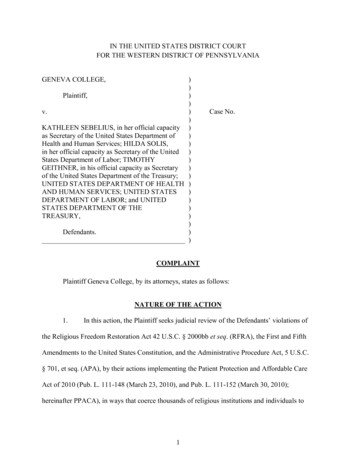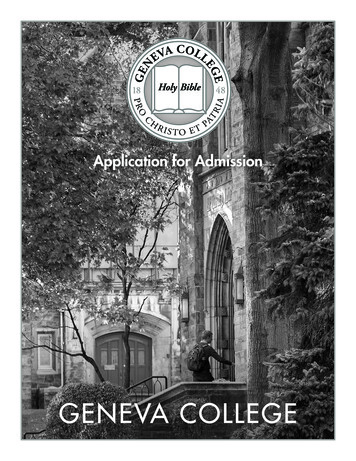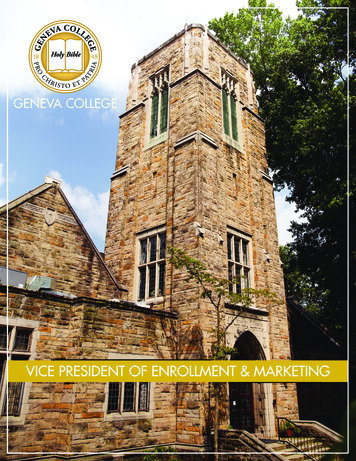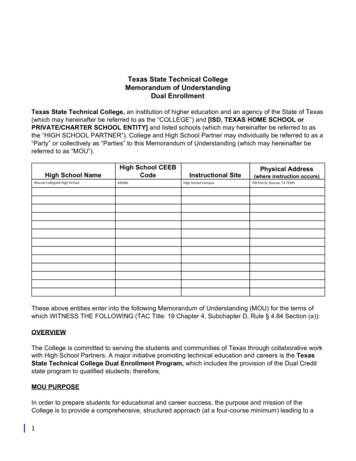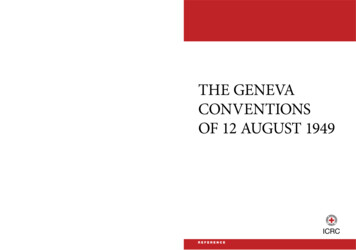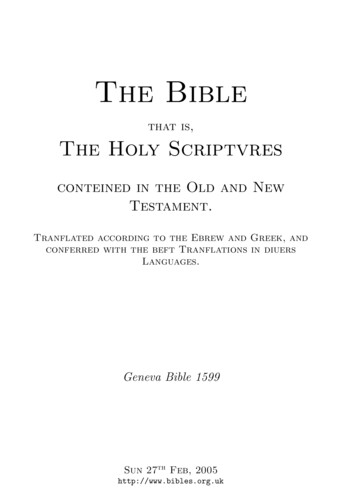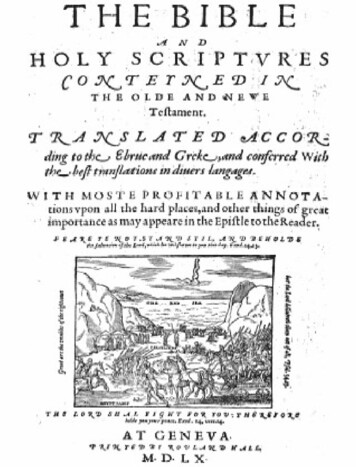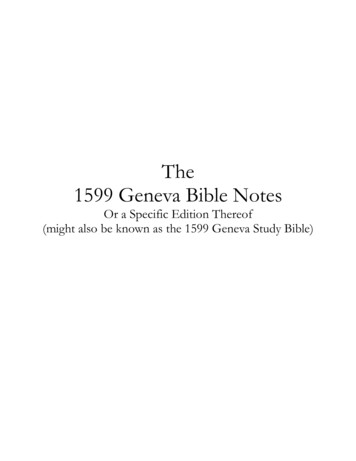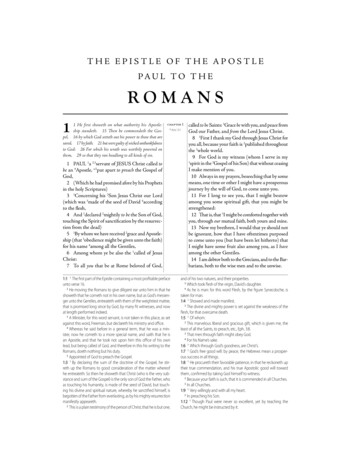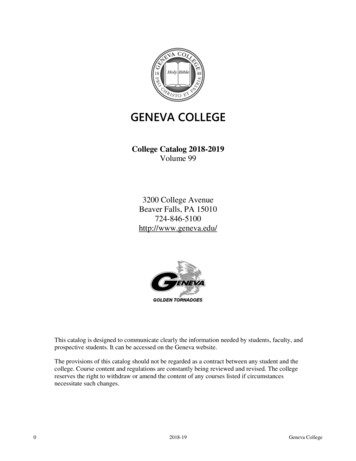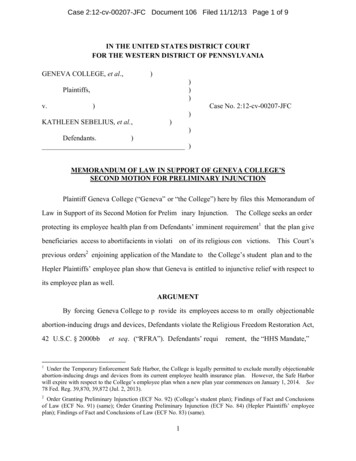
Transcription
Case 2:12-cv-00207-JFC Document 106 Filed 11/12/13 Page 1 of 9IN THE UNITED STATES DISTRICT COURTFOR THE WESTERN DISTRICT OF PENNSYLVANIAGENEVA COLLEGE, et al.,))))Plaintiffs,v.)KATHLEEN SEBELIUS, et al.,))Case No. 2:12-cv-00207-JFC)Defendants.))MEMORANDUM OF LAW IN SUPPORT OF GENEVA COLLEGE’SSECOND MOTION FOR PRELIMINARY INJUNCTIONPlaintiff Geneva College (“Geneva” or “the College”) here by files this Memorandum ofLaw in Support of its Second Motion for Prelim inary Injunction.The College seeks an orderprotecting its employee health plan fr om Defendants’ imminent requirement1 that the plan givebeneficiaries access to abortifacients in violati on of its religious con victions. This Court’sprevious orders2 enjoining application of the Mandate to the College’s student plan and to theHepler Plaintiffs’ employee plan show that Geneva is entitled to injunctive relief with respect toits employee plan as well.ARGUMENTBy forcing Geneva College to p rovide its employees access to m orally objectionableabortion-inducing drugs and devices, Defendants violate the Religious Freedom Restoration Act,42 U.S.C. § 2000bbet seq. (“RFRA”). Defendants’ requirement, the “HHS Mandate,”1Under the Temporary Enforcement Safe Harbor, the College is legally permitted to exclude morally objectionableabortion-inducing drugs and devices from its current employee health insurance plan. However, the Safe Harborwill expire with respect to the College’s employee plan when a new plan year commences on January 1, 2014. See78 Fed. Reg. 39,870, 39,872 (Jul. 2, 2013).2Order Granting Preliminary Injunction (ECF No. 92) (College’s student plan); Findings of Fact and Conclusionsof Law (ECF No. 91) (same); Order Granting Preliminary Injunction (ECF No. 84) (Hepler Plaintiffs’ employeeplan); Findings of Fact and Conclusions of Law (ECF No. 83) (same).1
Case 2:12-cv-00207-JFC Document 106 Filed 11/12/13 Page 2 of 9substantially burdens the College’s religiousexercise, and im posing the Mandate upon theCollege’s employee health insura nce plan is not the leas t restrictive means of advancing acompelling governmental interest. 42 U.S.C. § 2000bb-1(a) (governm ent generally m ay not“substantially burden” religious exercise); id. § 2000bb-1(b) (substantial burdens on religiousexercise permissible only if governm ent demonstrates that application of the burden to theperson is the “least restrictive means” of furthering a “compelling governmental interest”).This Court has twice c oncluded in this case that application of the Mandate is likely toviolate RFRA. It held that forcing SenecaHardwood and its fam ily owners to includecontraceptives, sterilization, and abortifacients in their employee health plan in violation of theirreligious convictions would likely transgress RFRA.And it held that the College would like lysucceed on its claim that RFRA forbids Defen dants from coercing it to facilitate acces s toabortifacients through its student health plan.The Court’s assessment of RFRA’s elem ents(substantial burden, com pelling governmental interest, least restric tive means) and thepreliminary injunction factors (m erits, balance of har ms, public interest) 3 in those contextsapplies equally in the present context (Genev a’s employee plan).As acknowledged by thisCourt in enjoining the a pplication of the Mand ate to the C ollege’s student plan, Defendants’so-called “accommodation” of re ligious entities like Geneva 4 does not eliminate the Mandate’ssubstantial burden on the College’s religious desire to avoid complicity in grave moral evil andto promote life-protecting beliefs and behavior by its em ployees and students. 5 According ly,this Court should prelim inarily enjoin Defendants from imposing the Mandate on the College’semployee plan.3A preliminary injunction is warranted if the movant demonstrates: (1) a likelihood of success on the merits; (2)that the movant will suffer irreparable harm if the injunction is denied; (3) that granting preliminary relief will no tresult in even greater harm to the nonmoving party; and (4) that the public interest favors such relief. Kos Pharm.,Inc. v. Andrx Corp., 369 F.3d 700, 708 (3d Cir. 2004).4“Coverage of Certain Preventive Services Under the Affordable Care Act,” 78 Fed. Reg. 39,870, 39,874-886 (Jul.2, 2013); 26 C.F.R. § 54.9815-2713A; 45 C.F.R. § 147.131.5Findings of Fact and Conclusions of Law, at 13 n. 8, 14, 15 (protecting student plan from “proposed rules,” whichincluded the substance of the soon-to-be-final “accommodation”).2
Case 2:12-cv-00207-JFC Document 106 Filed 11/12/13 Page 3 of 9I.THE COLLEGE IS LIKELY TO SUCCEED ON ITS CLAIM THAT APPLYINGTHE HHS MANDATE TOITS EM PLOYEE PLAN VIOLATE S THERELIGIOUS FREEDOM RESTORATION ACT.The College is lik ely to succeed o n its clai m that applyin g the HHS Mandate toitsemployee plan violates the Religious FreedomRestoration Act. The Mandate substantiallyburdens the College’s religious exercise;the final version of the then-proposed“accommodation” this Court cons idered in granting the College’s earlier preliminary injunctionmotion warrants no departure fromthat conc lusion. As this Courthas already held, theMandate is not the least restrictive means of advancing a compelling governmental interest.A.Applying the Mandate to the Colleg e’s Employee Plan Will Substantially BurdenIts Religious Exercise.This Court held that the Mandate, by requiring the Hepler Plaintif fs to include m orallyobjectionable drugs, devices, procedures, and services in their healthsubstantially burdened their religious exercise.12-16 (ECF No. 83).insurance plan,Findings of Fact and Conclusions of Law atThe Court obs erved that the Man date forced the Heple r Plaintiffs tochoose between transgressing thei r religious beliefs and dropping employee health coverageentirely in order to avoiId. at 14. It concluded that Dd that transgression.efendantssubstantially burdened the Hepler Plaintiffs’ religious exercise by inflicting this sort of Hobson’schoice upon them . I ndeed, this Court saidthat the Mandate imposed upon them “aquintessential substantial burden.” Id. at 16.The Court also held that the im posing the Mandate on G eneva’s student plan w ouldsubstantiallyburden the College’s religiousexercise, despite the (then-proposed)“accommodation.” Findings of Fact and Conclu sions of Law at 12-16 (ECF No. 91).Underthe original version of the Manda te, the student plan would have to cover, without cost-sharing,all FDA-approved contraceptives, including the abortion-inducing drugs and devices to whichthe College objects.In its Notice of Propos ed Rulemaking (NPRM), Defendants proposed a3
Case 2:12-cv-00207-JFC Document 106 Filed 11/12/13 Page 4 of 9rule that would allegedly “protect eligible organizations from having to contract, arrange, pay, orrefer for contraceptive coverage to which they obj ect on religious g rounds.”Findings of Factand Conclusions of Law at 11 (ECF No. 91) (quoting 78 Fed. Reg. at 8,462–64).The Collegeargued that, under the accommodation, it would still facilitate coverage and use of abortifacientsin violation of its religious beliefs.The Court held that the (then-proposed) accommodation would not eliminate thesubstantial burden on the College’s religious exercise:Geneva explicitly objects to the re quirement that it facilitate th e objectionablecoverage to its students, despite the accommodation proposed by defendants. Inlight of this fact, Geneva will be f orced to modify its behavior and to violate itsbeliefs by either giving up its [] healthinsurance generally or providing theobjectionable coverage. [T]his is a quintessential substantial burden .Findings of Fact and Conclusions of Law at 15-16 (ECF No. 91) (emphasis added).The proposed accommodation d iscussed in th e Court’s prio r opinion subsequentlybecame final in substan tially the same form.§45 C.F.R. § 147.131.See 78 Fed. Reg. 39,870, 39,874-879; 45 C.F.R.In the Second Am ended Complaint, the College expressly alleged thatcomplying with the Mandate, even with its“accommodation,” would transgress its relig iousbelief in the dignity of hum an life. Second Amended Complaint, ¶¶ 7, 220, 222 (E CF No. 98).If the proposed accommodation would not have alleviated the burden on the College’s re ligiousexercise in the student plan context, the final accommodation surely does not alleviate the burdenon Geneva in the employee plan context.To the extent the governm ent will argue th at the accommodation changes things, it isimportant to recognize the centrality of Geneva College to th e accommodation’s scheme.Under the accommodation, the College is still forced to provide health insurance to itsemployees because it has m ore than 50 full-tim e employees. W hen the College signs acertification of its religious objection and provide s it to the employee plan issu er, the insu rermust then provide abortifacient coverage to the persons covered in the College’s plan by givingthose persons a prom ise of “payments” for abor tifacients. This promise of paym ents occurs4
Case 2:12-cv-00207-JFC Document 106 Filed 11/12/13 Page 5 of 9only because the Colleg e is providing a plan to those persons—no promise would occur if theCollege did not have this insurance relationshipwith the plan participants.payments comes from the College ’s own insurer, because thatCollege to provide its employees health insuran ce.insurer is being paid by theAnd the promise of payments is deliveredprecisely to the Colleg e’s own employees and their dependents, bparticipants in the College’sThe promise ofecause those people areplan. Thus, under the “accommodation,” the College is anecessary and direct cause of abortifacient coverage for its health plan participants.Defendants insist that the College is not required to “contract, arra nge, pay, or refer forsuch coverage” and will presumably argue that it thus does not suffer a substantial burden.is, in essence, a moral argument.ThisBut Defendants cannot circumvent RFRA’s restraint on theirpower by second-guessing the College’s m oral judgment.The College religiously opposesfacilitating abortifacient payments in connection with its own health plan. It objects to being acentral cog in the m achine of the M andate’s delivery of promised abortifacient payments to theCollege’s own insured em ployees and their de pendents. Defendants cannot argue that theburden on the College’s religious exercise is not “substan tial” because other ways of involvingthe College in providing access to abortifacients exist.In any event, the governm ent is not delive ring the alleged benef its of the Ma ndateindependent of the Col lege, as if it were simemployees and giving them abortifacients.ply knocking on the doors of the College’sThe accommodation delivers abortifacient payments(1) to persons in the College’s plan, (2) only becau se they are in that plan—they would not get itotherwise, and (3) through the insurer the College is paying for its underlying plan.In fact, thefinal rule emphasizes as a virtue of the accommodation th at employees and students will not b ereceiving abortifacient payments under some separate policy or from a separate source; they willget their abortifacient payments in pure continuity with their own underlying insurance:This approach also m inimizes barriers in access to care because plan p articipantsand beneficiaries (and their health care providers) do not have to have twoseparate health insurance policies (that is, the group health insurance policy andthe individual contraceptive coverage policy).5
Case 2:12-cv-00207-JFC Document 106 Filed 11/12/13 Page 6 of 978 Fed. Reg. at 39,876.Thus, the inextricable re lationship between these “separate paym ents”and the College’s plan is exp ressly intended and deem ed desirable. When the g overnmentre-labels what is happening as “separate,” that does not change the reality that the College m ustplay an indispensable role in the coverage of items to which it objects.The government’s claimthat this arrangement is somehow “free” to the College misses the point that the College does notmerely object to paying for abortifacients;it objects to causing abor tifacient coverage inconnection to its own health plan.6By analogy, suppose the governm ent deemed pornography to be necessary to the healthand equality of fe male employees, family members and students at G eneva College. If theCollege objected to providing access to pornography for those persons, the government could notnegate the College’s religious objection sim ply by requiring the College to provide e mployeesand students with a “m ere” subscription to cable television, and then turn around and m andatethat the College’s own cable com pany, “not” th e College, provide “free” porn channels to thesame group of persons enrolled in the College’s cable subscription. The College’s moralobjection to facilitating access to pornography would still be ignored.Thus, Defendants factually wrong when it claims the accommodation does not impact theCollege’s beliefs against facilitating coverage for and the use of lifdevices.The government is also incorrect about “substantial burden.”e-destroying drugs andThat element of RFRAcannot be a foundation for second-guessing a claimant’s moral calculus, but instead measures themagnitude of the pressure the governm ent imposes upon an individual or entity to violate itsconscience. A law substantially burdens the exercise ofreligion w hen it com pels one “toperform acts undeniably at odds with funda mental tenets of their religious beliefs.”v. Yoder, 406 U.S. 205, 218 (1972).WisconsinA substantial bur den also exists where a law places“substantial pressure on an adherent to m odify his behavior and violate his beliefs.”Review Bd. of the Ind. Emp’t Sec. Div., 450 U.S. 707, 718 (1981).6Thomas v.As this Court concluded, theGeneva makes no financial contribution to the cost of student health insurance, yet this Court held that forcing theCollege to facilitate access to abortifacients by its students substantially burdens its religious exercise.6
Case 2:12-cv-00207-JFC Document 106 Filed 11/12/13 Page 7 of 9Mandate imposes a substantial burden sim ply by forcing the College “to choose betweenviolating its deeply held religious beliefs,” suffering penalties for not doing so, or suffering theharms inherent in dropping hea lth insurance coverage. For the employee health plan, droppinghealth insurance coverage com es with explicit government fines, it takes a specific health planaway from employees who rely on it, it robs employees who share the College’s beliefs of a planthat is m orally acceptable to them, it h arms the College’s ability to keep and attract goodemployees, and it would practically requirepaying em ployees more money (beyond thegovernment fines) for no longer receiving insurance as part of their compensation.As this Court sta ted in its Opinion a nd Order on Defe ndants’ Motion to Dism iss,“[c]ourts addressing similar challenges to the m andate’s requirements have ‘sim ply assume[d]that a law substantially burdens a person’s exerci se of religion when that person so claim s.’”(ECF No. 74 at 37, quoting Legatus v. Sebelius, No. 12-12061, 2012 WL 5359630 at *6 (E.D.Mich. Oct. 31, 2012)).Three times this Court ha s rejected the governm ent’s argument that itsMandate is too “atten uated” to c onstitute a substantial burden. Most recently the Courtconsidered the proposed accommodation and declared that “Geneva facilitates the p rovision ofits student health insurance, and to force it to choose whether or not to facilitate a student healthplan would be, like in Thomas[, 450 U.S. at 715], a line which it should not be forced to cross.”Findings of Fact and Conclusions of Law at 15(ECF No. 91).In its Findings of Fact andConclusions of Law regarding the Hepler Plaintiffs’ Motion for Preliminary Injunction, theCourt similarly declared the government’s “attenuation” argument as being inconsistent with theU.S. Supreme Court’s decisions in Yoder, Thomas, and Sherbert v. Verner, 374 U.S. 398 (1963).Findings of Fact and Conclusions of Law at 13-15 (ECF No. 83).argument in ruling on Defendants’ Motion to Di smiss.The Court also rejected thisMemorandum Opinion and Order at37-40 (ECF No. 74). The government’s argument fares no better here.7
Case 2:12-cv-00207-JFC Document 106 Filed 11/12/13 Page 8 of 9B.The Mandate Is Not th e Least Res trictive Means of Adva ncing a CompellingGovernmental Interest.This Court has previously held that theMandate failed strict scrutiny under RFRA.Findings of Fact and Conclusions of Law at 16-20 (ECF No. 83) (Hepler Plaintiffs’ em ployeeplan); Findings of Fact and Conclusions of Law at 16-19 (ECF No. 91) (Colle ge’s student plan).There is no basis for departing from those conclusions in the context of Geneva’s employee plan.Accordingly, the Colleg e is likely to succeed on its claimthat im posing the Mandate on itsemployee plan violates RFRA.II.THE BALANCE OF HARMS AND PUBLIC INTEREST WARRANT APRELIMINARY INJUNCTION.The Court previously held that the otherinjunction. Findings of Factinjunction factors warranted a prelim inaryand Conclusions of Law at 19-22 (College’s student plan);Findings of Fact and Conclusions of Law at 21-23 (Hepler Plaintiffs’ employee plan). There isno basis for departing from those conclusions in the context of Geneva’s employee plan.CONCLUSIONFor the foregoing reasons, Geneva Collegerespectfully requests that this Court issuepreliminary injunctive relief to protect its employee health plans from the Mandate.8
Case 2:12-cv-00207-JFC Document 106 Filed 11/12/13 Page 9 of 9Respectfully submitted this 12th day of November, 2013.s/Gregory S. BaylorGregory S. BaylorTexas Bar No. 01941500gbaylor@ alliancedefendingfreedom.orgSteven H. AdenDC Bar No. 466777saden@alliancedefendingfreedom .orgMatthew S. BowmanDC Bar No. 993261m bowman@alliancedefendingfreedom.orgALLIANCE DEFENDING FREEDOM801 G Street, NW, Suite 509Washington, DC 20001(202) 393-8690(202) 347-3622 (facsimile)Bradley S. TupiPennsylvania Bar No. 28682btupi@tuckerlaw.comDavid J. MongilloPennsylvania Bar No. 309995dm ongillo@tuckerlaw.com1500 One PPG PlacePittsburgh, PA 15222(412) 594-55-45(412) 594-5619 (facsimile)Local CounselKevin H. TheriotKansas Bar No. 21565ktheriot@ alliancedefendingfreedom.orgErik W. StanleyKansas Bar No. 24326estanley @alliancedefendingfreedom.orgALLIANCE DEFENDING FREEDOM15192 RosewoodLeawood, KS 66224(913) 685-8000(913) 685-8001 (facsimile)David A. CortmanGeorgia Bar No. 188810dcortm an@alliancedefendingfreedom.orgALLIANCE DEFENDING FREEDOM1000 Hurricane Shoals Road NESuite D-1100Lawrenceville, GA 30043(770) 339-0774(770) 339-6744 (facsimile)Attorneys for PlaintiffsCERTIFICATE OF SERVICEI hereby certify that on November 12, 2013, I electronically filed the foregoing with theClerk of Court using the CM/ECF system which will send notification of such filing to counselfor Defendants.s/9Gregory S. Baylor
Court in enjoining the application of the Mandate to the College’s student plan, Defendants’ so-called “accommodation” of religious entities like Geneva 4 does not eliminate the Mandate’s substantial burden on the College’s rel
